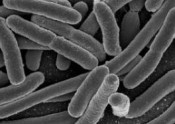via Phages: A Work in Porgress | 2013-06-11 | National Provisioner.
-
Recent Posts
- In which I start updating this website again November 18, 2022
- This Week in Virology #502: Texas road phage July 17, 2018
- Novartis joins the Big Pharma exodus out of antibiotics | Endpoints News July 12, 2018
- Turning A Phage | IPATH at UC San Diego June 22, 2018
- Fighting Infection with Phages | NIH June 20, 2018
- Trillions Upon Trillions of Viruses Fall From the Sky Each Day | NYT April 15, 2018
- Superbugs Are Nearly Impossible to Fight. This Last-Resort Medical Treatment Offers Hope | Time Magazine January 8, 2018
- This man should have died, but unusual infusions saved his life – The Washington Post October 24, 2017
- Sewage Saved This Man’s Life. Someday It Could Save Yours. | HuffPost October 24, 2017
- Viral Soldiers | The Scientist Magazine January 13, 2016



